Kathmandu: What's Not to Like?
Boy, this place sure has gone down the crapper. When I first came in 1974...
In 1940 Thomas Wolfe's semi-autobiographical novel You Can't Go Home Again was published posthumously; it was about a young wandering-educator type who leaves home and spends years writing a novel in which he trashes his home town and neighbors, making himself an egregious persona non grata. I've often thought, though, that Wolfe could have written a more plausible novel entitled You Can't Leave Home Again. Not that you get too old to survive a long flight or too humorless to risk having the TAS confiscate your Depends. It's just that you lose patience for places that aren't ... home.
So, when I returned to Nepal this spring for the first time since 2003, I was prepared for that kind of cranky reaction. And sure enough, my impressions were pretty negative. In part, of course, this reaction was due to the fact that this was the first time I had left my new family -- and our two wolfhounds -- for more than a few days, and I was feeling guilty as hell; in part it's because I've aged and it's important to insist on the primacy of antediluvian experience. Nonetheless, the clarity of this tainted perspective gives me an opportunity to put together a list of those complaints that would most likely occur to a first-time visitor to Kathmandu.
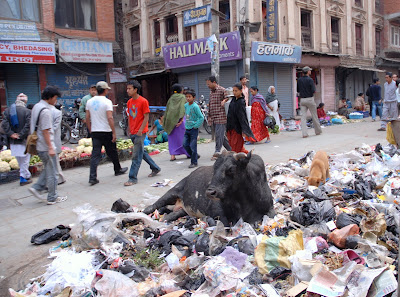

Transportation sucks
Right off the bat, you'll be unimpressed by Kathmandu's transportation system. As you stagger out of the airport, lame and groggy from a 48-hour flight, you are assaulted by taxi drivers and hotel touts. There's no bus or other public transportation to take you to the center of Kathmandu, six kilometers from the airport. You'll have to dicker with the taxi driver, because he won't use the meter (which would mean turning over more of his take to the boss). Back in 2003, when I was here last, there was a lot of talk about reporting drivers who wouldn't use the meter, but that didn't work, first because most meters were jimmied to make them run faster (MUCH faster), and second because the cops are corrupt. FYI, the standard fee for tourists is now 500 rupees (about $7), more after dark or if it's raining or if you look needy.
By the way, I once asked the head of Royal Nepal Airlines (now just Nepal Airlines) why he didn't run buses from New Road to the airport, and he said, "Because the taxi drivers would stone the buses." He was not joking.
There are buses in and around Kathmandu, as well as minibuses and tempos, but they are not for the cranky. The fares are tiny, but so is the leg room -- if you get a seat. There are also bicycle-rickshaws (as opposed to the auto-rickshaws, or tuk-tuks, common in New Delhi), and an argument can be made for the ecosensitivity of this mode of transport, but you will almost certainly be massively overcharged (by local standards) and, imho, you'll look like a colonial pasha, especially when the rickshaw wallah has to get off the bike and drag your ass up a slope.
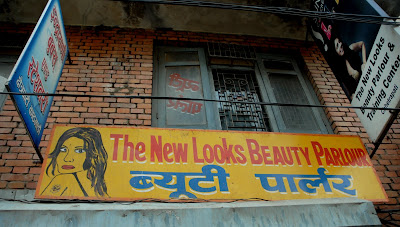
It's filthy
Cosmetically, things are marginally better than they were eight years ago. Some Kathmandu streets have been paved, or repaired, and there are crews out every morning sweeping up. It's kind of like trying to clean up an overflowing toilet with a sponge. There's no place to put the stuff -- no waste processing plants -- and no effort to prevent the it from reaching the street in the first place. There are essentially no garbage cans, public or private: people just toss their stuff out the window, as they did in ancient Rome -- except that Kathmandu has no sewer system.
So what happens to the garbage? Apparently, the preponderance ends up in the rivers, eventually to be flushed down to India by monsoon rains. Don't worry though, by all accounts India does a lot worse to Nepal.
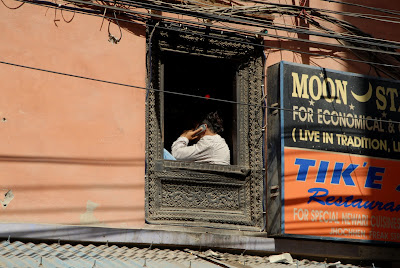
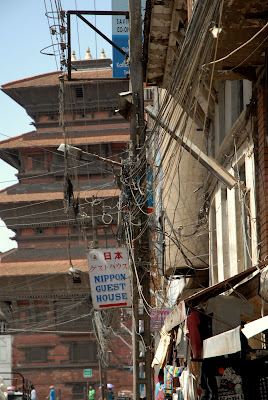
It's unhealthy
Largely because of the unmanaged filth, the water is contaminated, and it's nearly impossible to avoid getting some kind of dysentery. Sure, many tourists think they know how to manage the problem -- eat only at "safe" places, drink bottled water, and so on -- but it's all just snapping your fingers to keep the elephants away. As long as no elephants show up, you may be positive your system works, but if you stay more than a few days, you'll get sick.
As for the bottled water, many people were shocked-shocked! a few years ago when it was discovered that most of it was just [contaminated] tap water. Personally, I'd be shocked if things were different today. It's just too easy to pay off the inspectors. Not to mention the fact that non-biodegradable plastics are generally considered the greatest waste management problem facing Nepal today.
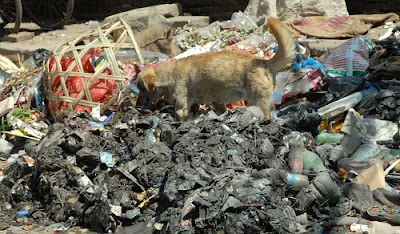
It looks like crap
That's kind of hard to believe, isn't it? A city of a thousand temples, gazillions of ancient statues, carved windows, yada-yada-yada. When I raise my camera to take a shot, you know what I see? Power lines. Telephone wires. Not just a little cross-hatching here and there, but great goopy wads drooping down to the sidewalk. Are they dangerous? I never touched them, but it must get interesting in the rainy season.
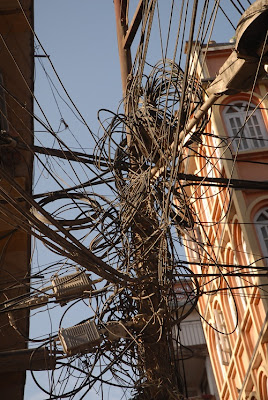

Even without the spaghetti, the place looks like crap. Dusty, shabby, streaked with mould, slathered with signs and billboards.

The traffic's pretty bad, too, and would be much worse were it not for the gas shortage.
It's murder on animals
If you like animals, you'll hate Kathmandu.
I'm not even talking about the conspicuous sacrifices and the open-air butchering: obviously, a case can be made that it is somehow better to be aware of, or even spiritually enhanced by, the death of those animals we eat. Facebook CEO Mark Zuckerberg may feel holier than thou because this year he's resolved to eat only animals that he himself kills; I feel holier than Mark, though, because in 1974 (confronted by fact that every time I ordered chicken curry in Kathmandu, someone would have to grab a chicken and kill it) I became a vegetarian.
Anyway, I don't want to argue about meat. Let's agree that you won't be grossed out by the fresh pig carcasses schlepped around town in rickshaws every morning. And that if you happen to push your way through a crowd of laughing and cheering townfolk and find that they are enjoying the spectacle of a hogtied buffalo have its throat sawed through with an eight-inch knife better suited to chopping onions, you'll just shoot the vid and post it for your friend on YouTube. (Here's one... youtube.com/watch?v=bH40BsHTKSg I only watched the first few seconds, so I don't know how long the knife was.)
I'm talking now about the street dogs. They're everywhere. Rooting through garbage, eating excrement, lounging in the sun, squabbling, brutalizing each other, screaming in the night. Admittedly, there's not as much night-screaming as there used to be. I think more people used to enjoy running over dogs. Now you see fewer with badly broken legs. But the physical suffering is still hard to stomach, even if it's just the mange and suppurating sores that the dogs somehow manage to ignore long enough to flop their tails at you and hope for a one-finger pat on the head.
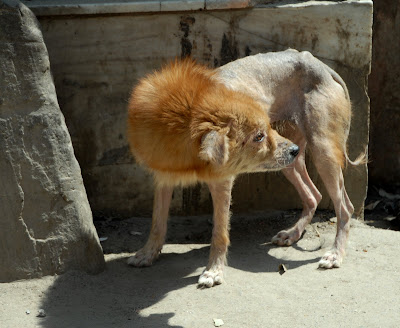
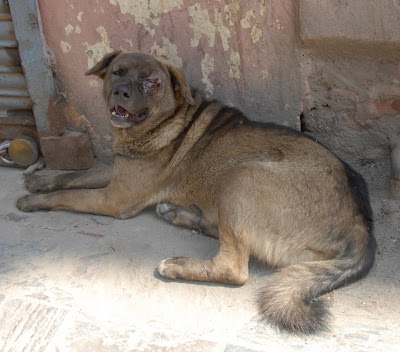


The government is a disaster
Tourists generally don't mind spending time and money in politically despicable countries. Spain became a hot destination despite the despotic Generalissimo Francisco Franco. China is one of the top tourist destinations in the world. That insouciance is a good thing for America: our own tourism industry would be in a lot of trouble if people stayed away just because we start wars for oil (and to avenge threats to the president's dad), or because we allow corporate greed to overrule our Constitution, or because our social safety net is a joke.
In Nepal, the political incompetence and corruption actually impinge on the convenience of tourists. The bhanda (general strike) has become less common, but the electricity shortage and consequent load-shedding is an ongoing pain in the butt. How can a country with so much hydroelectric potential and so many "donor countries" eager to start pouring concrete be enmired in such an intractable energy crisis?
Here's a snippet from a July 13 interview of Energy Minister Gokama Bista ("Load-shedding can be ended in three years: Minister Bista") :
I have worked as energy minister for only one-and-half months so far. During this time I have found the ineffective presence of the state, vested interest of political parties, hassles at local level, anarchy and procedural hassles are the major challenges to developing hydropower projects...
Okay, load-shedding is something tourists can learn to work around, like the siesta in Mexico. But the fact that the upshot of a protracted and vicious revolution is a protracted political morass has had an inevitable impact on the mood of the people. The optimism of new material development and political liberation is gone. Luckily, no one is blaming it on us... yet. Nepal's corruption has no obvious colonial roots. Some of the mess is due to mucking around by India; China has contributed, too, primarily by disrupting relations with Tibet. But largely it's homegrown corruption, just as the sale of girls into sexual slavery is a time-honored tradition. But when you raise people's hopes and expectations, leading them to believe that along with cellphones and mosh pits will come economic opportunity, there's going to be disappointment; that's what Sarah Palin is counting on when she asks, "How's that hopey-changy thing working out for you?" We may like the idea of going "Back to K-K-K-Kathmandu" (a classic Bob Seger anthem), but it's hard to enjoy being in a place that all the locals agree is going to hell in a handbasket.
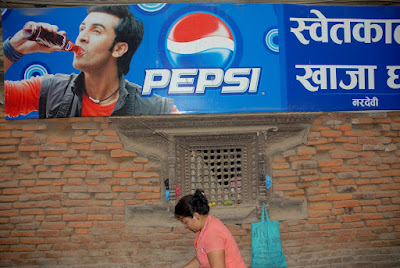
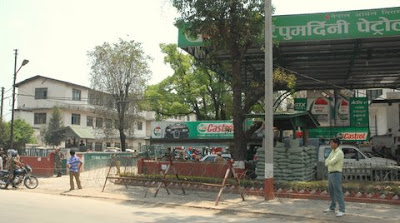
One of a half-dozen gas stations in Kathmandu. (Note sandbags and barbed wire.)
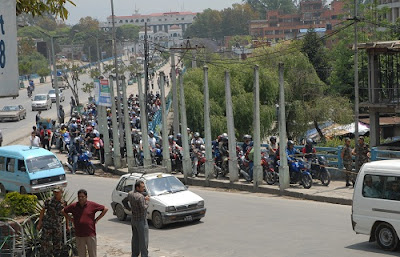
Motorcyclists waiting in the sun for gas. The gas station isn't even open. (Note the two soldiers and the police line.)
Postscript
Travel writers are supposed to be rah-rah about the places they visit, aren't they? It's a generic constraint; porn writers and nonprofit grant-writers must face a similar challenge. For someone working on do-goody projects, it's tantamount to treason to talk trash about your focal area. I do feel bad that I can't pretend Kathmandu is a place I would recommend for a short visit. On the other hand, there are plenty of great "partour ops" in Kathmandu (see: Nepal Compendium) and Kathmandu is and will remain the gateway to what is arguably the greatest trekking paradise in the world. So go. But don't expect that Kathmandu will be love at first sight.
Seth Sicroff, Nepal Editor for Wandering Educators
All photos courtesy and copyright Seth Sicroff
